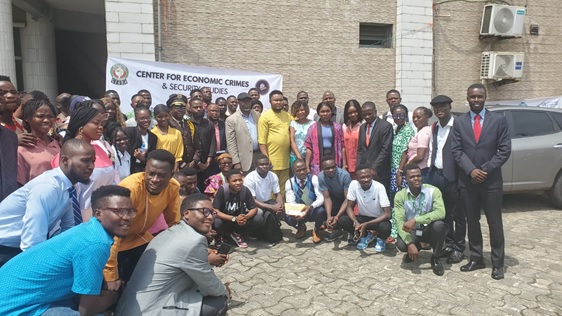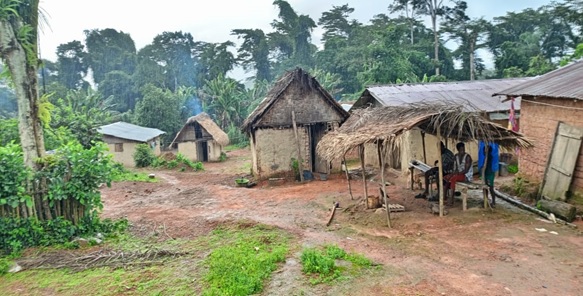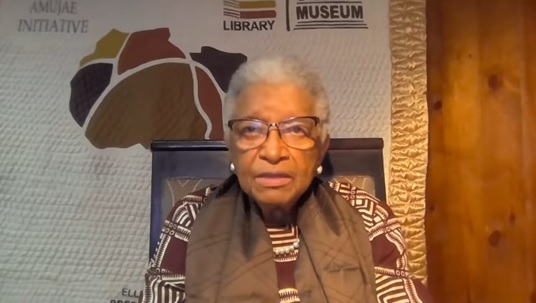MONROVIA – The Center for Economic Crimes & Security Studies (CESS) hosted a pivotal one-day roundtable on Preventive Measures Against Violent Extremism and Terrorism in the Mano River Union (MRU) region on Wednesday, October 30, 2024. The event, held at the Corina Hotel on Tubman Boulevard in Monrovia, brought together key stakeholders to discuss the growing concerns over security and resilience in the subregion.
The theme of the roundtable was “Generating Responses to Prevent Terrorism and Violent Extremism in Liberia and the Subregion.” Its goal was to foster collaboration, generate mutual understanding, and develop actionable strategies to mitigate the rising threat of radicalization and extremism.
Christopher Seeton, Program Coordinator of CESS, set the tone for the discussions by emphasizing the critical importance of the forum. “It is both an honor and a privilege to stand before you today at this significant gathering dedicated to addressing one of the most pressing challenges of our time – the threat of violent extremism and terrorism in the Mano River Basin,” Seeton remarked.
He highlighted the dual identity of the region as a hub of cultural richness and resilience, as well as a hotspot for socioeconomic and political challenges that can contribute to extremism. “The path to peace is paved with understanding, dialogue, and cooperation,” Seeton added, stressing the need for a comprehensive and inclusive approach to security in the region.
Seeton further stressed the importance of involving local communities in security strategies. “We must engage with communities, listen to their concerns, and empower them to be active participants in their own security,” he urged. He noted that education plays a central role in preventing radicalization, emphasizing that promoting critical thinking, tolerance, and respect for diversity would equip youth with the tools they need to resist extremism.
“By sharing best practices, intelligence, and resources, we can build a framework for stability across the Mano River Basin,” Seeton said. He also pointed to socioeconomic disparities, political grievances, and systemic injustices as major drivers of extremism. Seeton encouraged attendees to develop actionable strategies to address these issues, ensuring that the youth in the region can become champions of peace.
Following Seeton’s opening remarks, the panel discussion began with a presentation by three distinguished panelists: Allen S. Charleson, Assistant Minister for Plan, Policy, and Operations at the Ministry of Defense; Cllr. Boakai N. Kanneh, Chairman of the Law Reform Commission; and Lawrence A. Yealue, Country Director of Accountability Lab Liberia.
Allen S. Charleson addressed the participants by emphasizing the importance of understanding the regional security context. He noted that the prevalence of terrorism and violent extremism in West Africa, including countries like Nigeria, Mali, Niger, and Burkina Faso, highlights the urgency of the issue. Charleson explained that many of these problems stem from irregular warfare, which differs significantly from conventional warfare. He stressed that Liberia’s relative peace provides an opportunity to focus on mitigating factors such as corruption, poverty, and unemployment, which can exacerbate instability.
Charleson explained that weak governance, economic inequality, and exposure to extremist ideologies contribute to terrorism and violent extremism. He distinguished between terrorism, which often involves isolated, fear-inducing acts of violence, and violent extremism, which represents a persistent and evolving ideology. He also highlighted the critical importance of border and maritime security in combating these threats, noting that Liberia’s capacity for border security is relatively strong but maritime security remains a challenge.
He proposed several measures to strengthen Liberia’s resilience against extremism, including addressing governance issues, fostering economic opportunities for youth, and enhancing local engagement through dialogue. Charleson emphasized the importance of public awareness and security preparedness, urging the sharing of information about security risks with the population. He pointed to regional collaboration as essential, citing an incident where Chinese vessels were successfully intercepted through coordinated efforts between Liberia and Sierra Leone.
Charleson also advocated for the creation of a regional hub for security collaboration, where MRU countries could rotate management responsibilities. He called for joint border patrols to counter illicit activities, including the trafficking of drugs, and stressed the need for enhanced security measures to address new and innovative tactics employed by traffickers, such as hiding contraband beneath canoes.
Cllr. Boakai N. Kanneh, a law professor at the University of Liberia, spoke about the complexities surrounding the definition of terrorism. “The term ‘terrorism’ is often subjective,” Kanneh said, noting that what one group might consider terrorism, another may view as a freedom struggle. He discussed the historical context of terrorism, explaining how liberation movements in Africa during colonial times, such as the African National Congress (ANC) in South Africa, were labeled as terrorist organizations by colonial powers but seen as freedom fighters by the oppressed population and the international community.
Kanneh went on to discuss how terrorism has evolved in the modern world, particularly following the collapse of the Soviet Union, which led to an increase in global conflicts. He emphasized that the causes of terrorism are often rooted in political, social, and economic grievances, such as political instability, poverty, and social injustice. He warned that Liberia and the MRU region must address these underlying issues to prevent the rise of extremism.
He also touched on the rise of drug abuse, especially among youth, and its impact on social stability. He explained that the proliferation of drugs, such as ‘crocodile’ substances, has created a marginalized youth population that exacerbates societal challenges. Kanneh pointed out that such issues, along with the suppression of political freedoms, manipulation of elections, and corruption, create fertile ground for extremism.
Mr. Lawrence A. Yealue, Country Director of Accountability Lab Liberia, wrapped up the discussion by stressing the importance of practical solutions to combat terrorism. He shared his experiences living in several countries in the MRU region, including Ghana, Nigeria, and Togo, and stressed the significance of making discussions about terrorism both relatable and actionable.
Yealue pointed out that many people understand terrorism only from a textbook perspective and fail to see its indirect effects. He asked, “Who here has been directly affected by terrorism?” When only a few hands were raised, he explained how security measures implemented in response to terrorism in neighboring countries often impact ordinary citizens through redirected tax revenues and financial burdens.
He also criticized the political rhetoric surrounding terrorism, pointing out how politicians often declare “zero tolerance for terrorism” but tolerate other forms of systemic injustice. Yealue emphasized the importance of addressing these injustices, such as corruption, poor infrastructure, and road degradation, which contribute to the conditions that allow terrorism to thrive.
Yealue argued that combating terrorism begins with investing in education. He criticized the state of education in Liberia, where “free education” often lacks quality, and called for a transformation of the educational system to create informed, engaged citizens. He also advocated for economic development through local industries and a more self-reliant economy, criticizing Liberia’s reliance on foreign investments that do not always benefit the country.
He concluded by urging cross-border collaboration in the region to raise awareness and promote civil engagement. He also called for a national conversation on the role of foreign businesses in Liberia and their potential links to extremist financing. He encouraged university students to take an active role in national dialogues and contribute to intellectual and policy discussions.
The roundtable discussion concluded with representatives from various institutions, including the Liberia Immigration Service, Liberia Fire Service, CENTAL, IREDD, IPER, CEMESP, the Financial Intelligence Agency, the National Imam Council of Liberia, university students, and civil society organizations, all pledging to work together toward creating a more secure and stable region.







